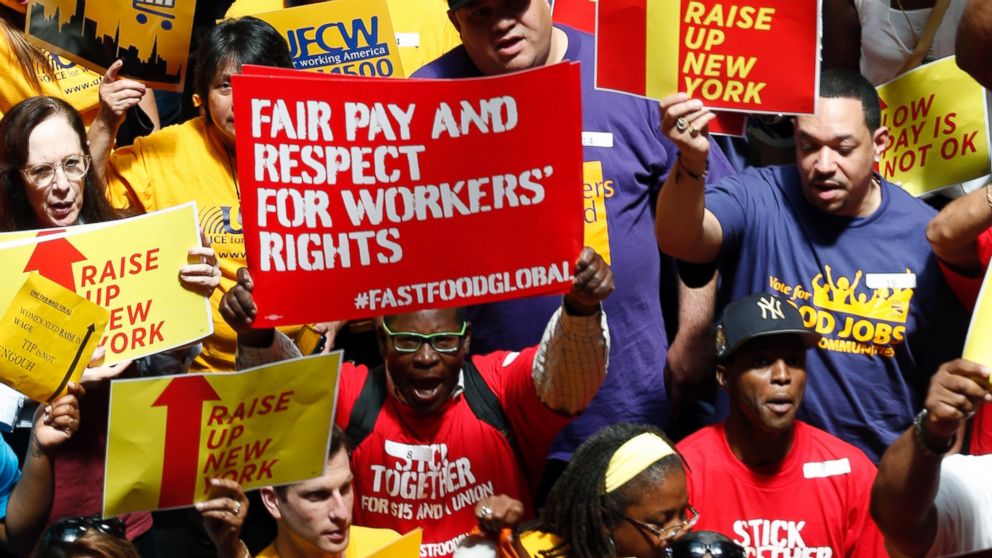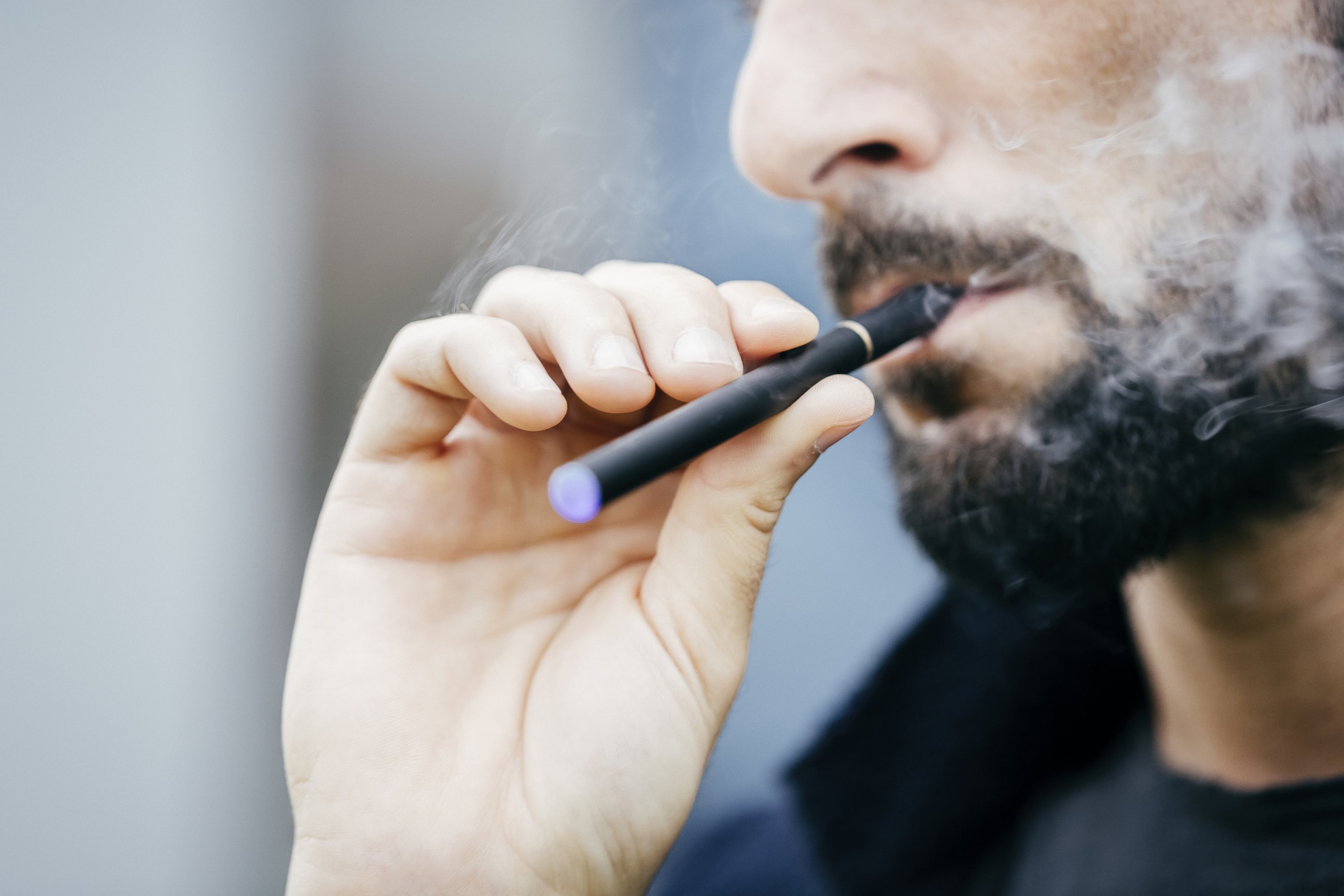New Year, New Rules: A Look At Laws Going Into Effect In 2015
New laws include banning leaf blowers, redefining "milk," and dining with dogs

— -- Banning leaf blowers? Redefining "milk?" Making living conditions better for hens? In 2015, a number of new state and local laws will go into effect across the country, and you may see some of these changes being made in your area.
MINIMUM WAGE
Minimum wage is increasing in 21 states and five cities. Washington State will continue having the highest minimum wage of any state, increasing to $9.47 from $9.32. Connecticut, Massachusetts, Oregon, Rhode Island and Vermont employees will also make at least $9 an hour.
Four California cities – Richmond, San Francisco, San Jose and Sunnyvale – along with Las Cruces, New Mexico, are also increasing wages. San Francisco will boost its minimum wage, already the highest of any state or city, from $10.74 an hour to $11.05.
CALIFORNIA
California will add over 930 new laws in 2015, most of which will go into effect on Jan 1.
Driving forward: All California residents, regardless of immigration status, will be eligible to apply for a driver's license after passing The Safe and Responsible Driver Act (AB60) in 2013. 1.4 million undocumented Californians will be eligible to apply for licenses under the new law.
Dining with dogs: Restaurants will have the option of allowing dogs on outdoor patios.
Only doing it with consent: Any university receiving financial aid from the state must adopt a sexual assault policy with an "affirmative consent standard" – also known as "yes means yes."
Stopping leaked selfies: Existing law makes it illegal for someone to distribute sexually explicit photos or videos taken of another person without their consent. But a bill going into effect in July will make it a crime to distribute all "revenge porn," regardless of who took the photos (including selfies).

Cage-free California: Starting Jan. 1, all egg-laying hens raised in California must be able to stand up, lie down, turn around and fully extend their wings in humane living conditions.
Strengthening handgun laws: The current law requires all handguns, excluding single-shot pistols, to meet safety requirements and be approved by the state. Since single-shot guns weren't included in the original law, people began altering semiautomatic handguns into single-shot guns to avoid the law. Under new law, altered guns must meet state requirements.
Banning plastic bags: Starting in July, plastic bags will no longer be used at large grocery stores and supermarkets like Wal-Mart and Target, unless for packaging fruits, vegetables and meats. A minimum 10 cent fee will be added per paper bag used. More than 100 counties and cities in California already have similar laws in place, but business groups are trying to fight the ban and have enough signatures to put their referendum on the November 2016 ballot. If the referendum qualifies, the statewide ban will be put on hold.
Chilling out: Employees in California are granted "recovery periods" or cooldown periods to prevent heat illness. A new law clarifies that these cooldown periods are paid breaks.
LOS GATOS – No more leaf blowing: A new law bans gasoline leaf blowers in the town because they "degrade quality of life… by polluting the air, posing multiple health risks for operators and residents, generating high noise levels, and disrupting neighborhood tranquility.
All single packs of cigarettes, or alternative nicotine products like e-cigarettes, must be sold from behind the counter or in a sealed case. Refills must also be sold in child-proof packaging.
Protecting wolves, bears and cougars: The gray wolf, American black bear and cougar will be added to the list of protected species in Illinois as an effort to guard the animals who have recently been returning to the state.
Banning "the box": Current law allows employers to ask job applicants about their criminal record during an in-person interview, but the new law will prohibit employers with 15 or more employees from asking a job applicant about their criminal history prior to the interview or until after a job offer is made. Known as the Job Opportunities for Qualified Applicants Act, the law aims to "ensure that all qualified applicants are properly considered... and not pre-screened or denied an employment opportunity unnecessarily or unjustly."
Stopping cyber-bullying in and out of the classroom: Previously only applied inside the classroom, the new law now prohibits cyberbullying outside of school. Schools will be required to investigate any bullying that causes a disruption to the classroom.
Using medical marijuana to treat epilepsy and seizures: Epilepsy will be added to the list of conditions that can be treated with medical marijuana, and will be allowed for use by minors who suffer from seizures. The Department of Public Health can set rules to use marijuana to treat other diseases in minors with a parent's permission.
IOWA
Eliminating Social Security income tax: Iowa's Social Security income tax phase out was signed in 2006 as part of a $118 million tax cut. For eight years, the state has gradually been phasing out the tax, and in 2015 it will be eliminated. At the time it was passed, state officials suggested it could save Iowa's seniors between $200 and $700 a year.
Stopping underage partying: Under new law, adults who knowingly allow underage people to drink alcohol on their property can face misdemeanor criminal charges. Additionally, the bill makes it illegal for people under 21 to consume alcohol – previously they were prohibited from purchasing or possessing it.
Strengthening laws on human trafficking: New laws on human trafficking in Iowa create harsher penalties for pimps, including a $1000 fine. All fines collected will be placed in a fund used to provide services, programs and support to victims of human trafficking. The law will also give county attorneys some leeway when dealing with minors involved in prostitution, giving them the option to refer the minor to human services.
MASSACHUSETTS
Lifting the ban on 'hold open' clips nozzles on gas pumps: Customers at self-service gas stations will no longer have to stand and hold the nozzle the entire time they're pumping gas.
Sipping on more red wine: Wine enthusiasts will now be able to enjoy out-of-state wine shipped directly to them in Massachusetts. Previous law had prevented shipments from "larger wineries," or 98 percent of wine that was produced out of state.
E-recycling: New Yorkers will no longer be allowed to throw away electronics such as computers, televisions, VCRs, DVD players or video game consoles in the garbage. Instead, they must recycle their electronics at one of the state's collection sites or through a manufacturer's take back program. Failing to recycle could result in a $100 fine.
Banning "tiger selfies:" Gov. Andrew Cuomo signed a law that will ban the public from coming in close contact with tigers, lions or other big cats – prohibiting them from taking photos or "tiger selfies" with the animals, a popular trend on social media.
OREGON
Requiring sellers to say if home was previously a meth lab: Sellers of foreclosed homes will be required to inform buyers if the property might contain toxic residue from previously being used as a methamphetamine lab.
Drinking teenagers no longer face possession charges for seeking medical help: People under the age of 21 who have been drinking will no longer be charged with alcohol possession if they seek medical help for themselves or others.
Children of volunteers will be eligible for scholarships: Under the Rob Libke Scholarship Act, children of emergency reserve or volunteer personnel who are killed or disabled during duty are eligible for four-year scholarships to a public university.






